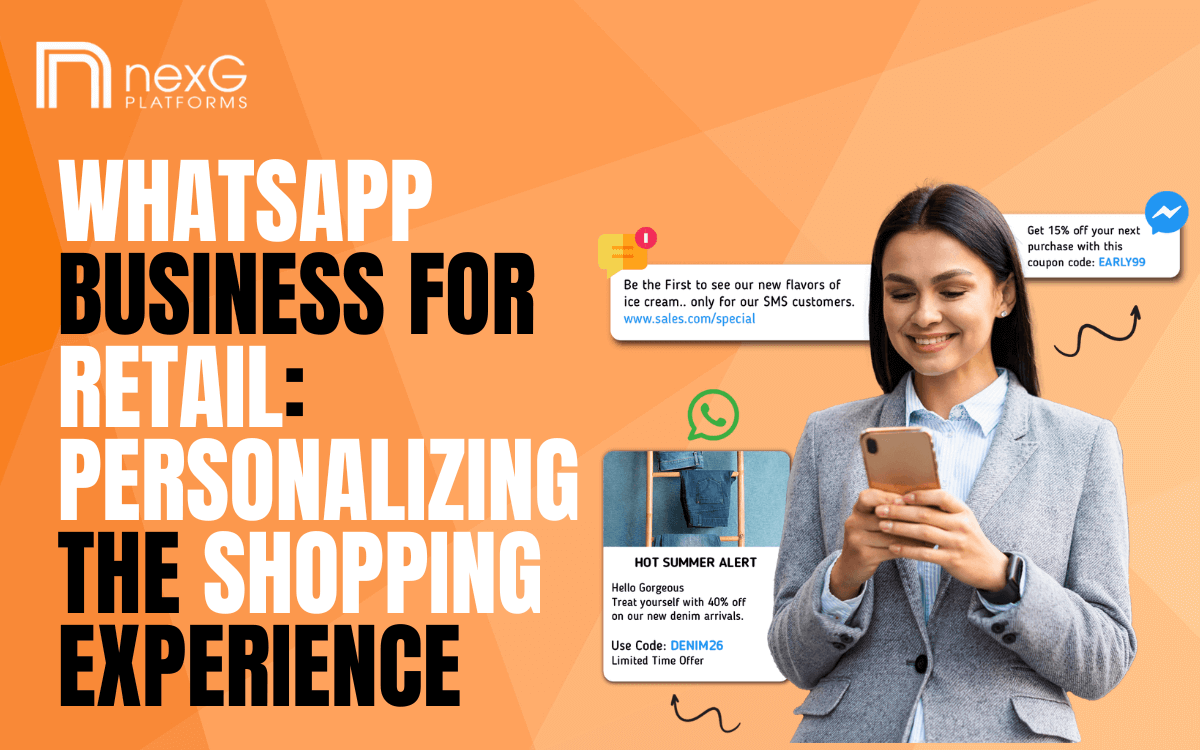In the digital age, shoppers expect more than just good products; they want quick responses, tailored offers, and smooth buying journeys. For retail businesses, that means customer interaction needs to be fast, personal, and effective. This is where WhatsApp Business API changes the game.
With over 2 billion active users, WhatsApp is no longer just for casual chats. For retailers, it’s becoming a critical part of retail messaging solutions, helping brands connect with customers, streamline queries, and boost efficiency. Whether you’re running a boutique store or a large retail chain, integrating WhatsApp API for Business to boost retail sales can help you maximize leads, optimize sales, and keep customers coming back.
Why WhatsApp Business Matters for Retail
First impressions matter. When a customer opens your WhatsApp chat, your business profile should clearly tell them who you are and what you offer. Include your store name, logo, address, website link, and working hours. This isn’t just about looking professional, it’s about building trust right from the first message.
Benefits:
- Builds brand credibility instantly.
- Makes it easy for customers to find essential information.
Personalizing Customer Communication
One of the biggest strengths of the WhatsApp Business API is the ability to personalize. Retailers can segment their audience based on buying history, browsing habits, or even location, and then send them tailored messages.
Example: If a customer bought running shoes from your store last month, you could follow up with a message about a new sportswear collection or offer them a discount on accessories.
Benefits:
- Creates a stronger emotional connection with customers.
- Increases repeat purchases and loyalty.
Quick Replies for Faster Responses
Speed is everything in retail communication. Customers expect answers within minutes, not hours. Quick replies pre-set responses for common queries help your team reply instantly to frequently asked questions like product availability, store timings, or return policies.
Benefits:
- Saves valuable time for both staff and customers.
- Keeps the tone and information consistent.
Broadcast Lists for Targeted Marketing
A broadcast list allows you to send the same message to multiple customers without creating a group. It’s perfect for announcing seasonal sales, new product launches, or special events.
Example: “Hey! We’ve just launched our summer collection. Check it out here [link].”
Benefits:
- Keeps customers in the loop about promotions.
- Encourages more visits (both online and in-store).
Automating Support with Chatbots
Retailers can integrate AI-powered chatbots into WhatsApp marketing automation. These bots can handle FAQs, track orders, process simple transactions, and even make product recommendations.
Benefits:
- Reduces wait times for customers.
- Offers 24/7 service without increasing staff workload.
Showcasing Products with WhatsApp Catalog
The catalog feature is one of the most powerful tools in the WhatsApp Business API. Retailers can upload product images, descriptions, and prices directly into WhatsApp. Customers can browse and even place orders without leaving the chat.
Benefits:
- Creates a smooth shopping experience.
- Helps customers make faster purchase decisions.
Gathering Customer Feedback
Feedback is gold for retail businesses. After a purchase, you can send a quick message asking the customer to rate their experience or share suggestions.
Benefits:
- Helps improve services and products.
- Shows customers that you value their opinion.
How WhatsApp Drives Retail Sales
When used right, WhatsApp is more than just a chat tool it’s a sales engine. Let’s break down how the WhatsApp API for Business to boost retail sales actually works in real-world scenarios:
- Upselling & Cross-selling: Send curated recommendations based on past purchases.
- Exclusive Discounts: Reward loyal customers with time-limited offers.
- Event Promotions: Promote in-store events or online shopping festivals.
- Order Updates: Keep customers informed at every stage order confirmed, packed, shipped, and delivered.
Streamline Queries, Boost Efficiency
Retail staff often spend hours handling repetitive questions. With retail messaging solutions powered by WhatsApp, these interactions can be automated, freeing up staff to focus on more complex requests. This means fewer delays, happier customers, and more efficient use of time.
Benefits:
- Reduces operational costs.
- Improves team productivity.
Integrating WhatsApp with Other Retail Tools
The real magic happens when WhatsApp marketing automation is connected to your CRM, inventory system, or e-commerce platform. Imagine a customer asking about a product, and your system instantly checking stock levels and confirming availability, all without human intervention.
Benefits:
- Smooth, error-free operations.
- Better tracking of customer interactions.
Case Example: Boosting Sales with WhatsApp
A mid-sized fashion retailer integrated WhatsApp API for Business into their sales process. They used it for product announcements, customer service, and personalized promotions. Within three months, they reported:
- 28% increase in repeat orders.
- 35% higher open rates compared to email marketing.
- Faster resolution times for customer queries.
Why Now Is the Time to Invest in WhatsApp for Retail
Retail is competitive. Customers have endless options and little patience. By using WhatsApp, you’re meeting them where they already are, with tools that let you maximize leads, optimize sales, and deliver experiences they’ll remember.
It’s not just about keeping up with trends it’s about creating a more connected, responsive, and profitable retail business.
The future of retail communication is personal, instant, and interactive. With WhatsApp Business API, retailers can send rich media, automate conversations, showcase products, and create genuine connections with customers.
Whether you’re aiming to streamline queries, boost efficiency, or turn casual shoppers into loyal buyers, WhatsApp has the tools to make it happen. The sooner you start, the sooner you’ll see the impact on your bottom line.


